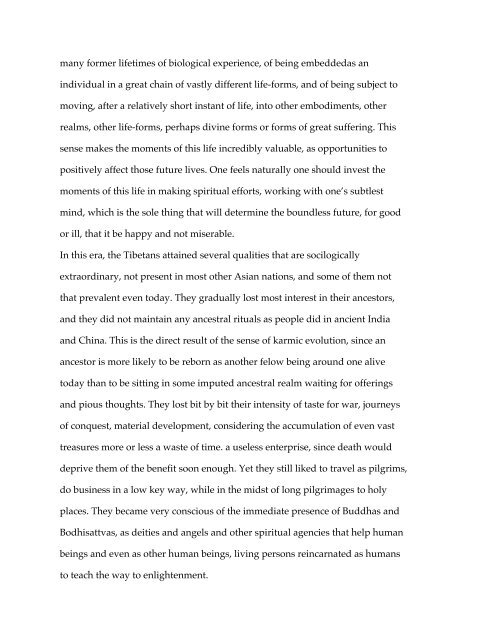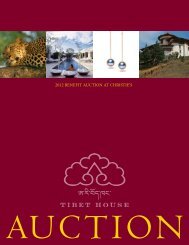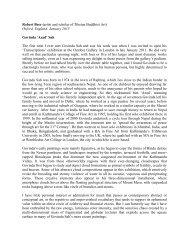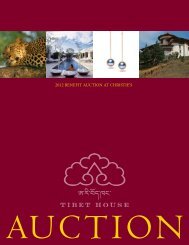Thurman, Essential Tibetan Buddhism Introduction (part) - Tibet House
Thurman, Essential Tibetan Buddhism Introduction (part) - Tibet House
Thurman, Essential Tibetan Buddhism Introduction (part) - Tibet House
You also want an ePaper? Increase the reach of your titles
YUMPU automatically turns print PDFs into web optimized ePapers that Google loves.
many former lifetimes of biological experience, of being embeddedas an<br />
individual in a great chain of vastly different life-forms, and of being subject to<br />
moving, after a relatively short instant of life, into other embodiments, other<br />
realms, other life-forms, perhaps divine forms or forms of great suffering. This<br />
sense makes the moments of this life incredibly valuable, as opportunities to<br />
positively affect those future lives. One feels naturally one should invest the<br />
moments of this life in making spiritual efforts, working with one’s subtlest<br />
mind, which is the sole thing that will determine the boundless future, for good<br />
or ill, that it be happy and not miserable.<br />
In this era, the <strong><strong>Tibet</strong>an</strong>s attained several qualities that are socilogically<br />
extraordinary, not present in most other Asian nations, and some of them not<br />
that prevalent even today. They gradually lost most interest in their ancestors,<br />
and they did not maintain any ancestral rituals as people did in ancient India<br />
and China. This is the direct result of the sense of karmic evolution, since an<br />
ancestor is more likely to be reborn as another felow being around one alive<br />
today than to be sitting in some imputed ancestral realm waiting for offerings<br />
and pious thoughts. They lost bit by bit their intensity of taste for war, journeys<br />
of conquest, material development, considering the accumulation of even vast<br />
treasures more or less a waste of time. a useless enterprise, since death would<br />
deprive them of the benefit soon enough. Yet they still liked to travel as pilgrims,<br />
do business in a low key way, while in the midst of long pilgrimages to holy<br />
places. They became very conscious of the immediate presence of Buddhas and<br />
Bodhisattvas, as deities and angels and other spiritual agencies that help human<br />
beings and even as other human beings, living persons reincarnated as humans<br />
to teach the way to enlightenment.





